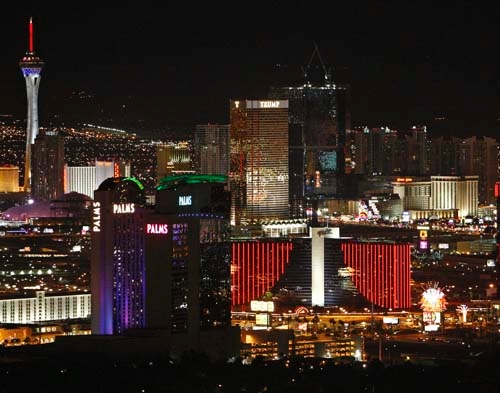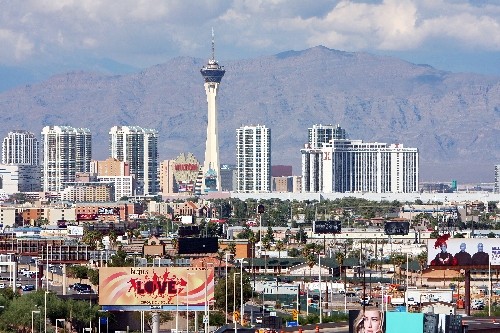Locals debate how rapidly once-thriving Las Vegas Valley will recover
For several years as the economy soared Las Vegas-style, obtaining financing for a business often involved little more than signing a home equity line of credit.
"I think it was easy but it was all funny money then," said Greg Twedt, chairman of the local chapter of the consulting nonprofit SCORE. "People could just refinance a house and suddenly have $100,000 for a business."
Over the past couple of years, with the boom over, would-be entrepreneurs have found obtaining startup or operating capital exponentially tougher. This highlights the type of adjustments the local businesses may face at least until a tangible recovery starts and perhaps long afterward.
The most recent growth spurt goes back to the end of 2002, as the city and the country began to regain their balance after the twin blows of the recession and the Sept. 11 terrorist attacks. But in a broader sense, boomtown was grafted into Las Vegas' DNA, with some interruptions, with the re-legalization of gambling and the start of the Hoover Dam in 1931. Since then, the population has doubled about every dozen years on average.
"It's amazing to me that the boom lasted for so long and went so high, much more than we have seen in other places," said Sung Won Sohn, a Los Angeles economist who recently joined the board of Western Alliance Bancorporation.
However, no place has stayed a boomtown forever. Whether San Francisco after the gold rush, Chicago starting in the 19th century, Detroit as the auto industry took off 100 years ago, Houston with oil or Los Angeles as the star of the Sun Belt, boomtowns have invariably settled into the growth patterns of "normal" cities.
Companies such as Intel Corp., Microsoft Corp. and Wal-Mart Stores have followed the same pattern.
Is it Las Vegas' turn? Opinions vary.
"Unlike past recessions, there is something that feels different this time and the data looks different," said Greg Carlson, an adviser with consulting firm Apertor Hospitality. "I am not seeing that the boomtown is finished, but I think we will have much lower growth rates unless we diversify. And so far, I don't see that happening."
Christopher Colwell, senior vice president of the gaming consulting and management company Fine Point Group, said, "I think we start to become a normal town. A big part of the boom was that the pent-up demand for gaming was released in just a few places, but now there is a lot more competition. To say we could become a boomtown again, that would be tough."
Some projections have showed the valley's population beginning to decline.
Although he agrees that casinos have proliferated both in the United States and many other countries, attorney Jeffrey Silver sees the seeds already sown for another big growth run.
"I think we will boom again," Silver said, "because we have so much capital deployed here that, when people come back, they will come back in large numbers."
The key spark necessary to reignite a boom, Silver and many others said, is a national unemployment drop big enough to encourage people to spend big again.
"Las Vegas is different than any other city in the United States. It is the playground of our world," he said. "Once the future is more certain for people, they will be back in Las Vegas just as quickly as they can."
Mark Larkin, president of Larkin Plumbing, takes a more tempered view. As the latest generation to run the company that has been a local fixture since 1936, he has seen economic plunges before only to see more robust rebounds.
"I think Las Vegas will come back as a boomtown," he said. "But will it be like it was before? I hope not."
He suggested that Las Vegas may have grown too fast. He said growth rates of 8 to 10 percent were too much for the city handle.
Once people feel comfortable again about "spending $3,000 on a weekend," business will rebound.
Two questions linger: whether the Strip can maintain its pre-eminence among gambling and resort venues and whether economic diversification will take hold this time after numerous false starts.
"Unless there is some significant diversification of the economy, Las Vegas is going to continue to be very different from other metro areas of the country," University of Nevada, Las Vegas economics professor Stephen Million said.
People expecting a renewed boom point to Seattle as a template. As the headquarters city for Boeing, Seattle took off with the start of the jet age in the mid-1950s and remained dominated by the aerospace industry for more than a decade. But the exodus that followed Boeing's stumbles in the late 1960s prompted one person to buy a billboard in 1971 that read, "Will the last person leaving Seattle turn out the lights?"
In 1979, however, an unknown software writer named Bill Gates moved to Seattle and co-founded Microsoft, which grew into a tech giant and helped recast the city has a high-tech hub.
A recovery that produces growth rates in low single-digits would lead to a major change in the attitude for running a business, a process already under way, observers say.
But, they add, companies can no longer expect that mass influxes of people will arrive and help paper over failure to plan for cost controls.
Already, companies are adapting to postboom business. On Oct. 25, Las Vegas Sands Corp. announced a 10-year deal to tie its customer base with that of InterContinental Hotels Group, which includes Crowne Plaza, Holiday Inn and other brands. Earlier, the Cosmopolitan of Las Vegas said it will join marketing forces with Marriott, chipping away at the Strip as a stronghold of fully independent operators.
"Business here up through 2007 was rather spectacular, and frankly, I don't think anybody really felt they had to look outside their own world," Sands Chief Operating Officer Michael Leven told The Associated Press.
In the valley's southwest corner, St. Rose-San Martin and Southern Hills hospitals were built within a couple of miles of each other based on projections that the area would be a construction hotbed for years. Now, they have posted tens of millions of combined operating losses each year because building has stopped and left them close to tracts of open desert.
"When the tide goes up, it certainly covers a lot of mistakes," Colwell said. "The recession has certainly forced major operators to look at how they run their businesses."
Silver added, "A lot of managers thought they were brilliant during the boom. It wasn't so."
Business leaders who don't adapt to new realities, he said, are finding themselves pushed out of their corner offices.
In counseling small-business clients, Twedt said, SCORE has increased its focus on fundamentals and developing business plans that work in the real world.
"In the past, I don't know how many people were consciously lax in their business practices," Twedt said. "My sense is that people didn't know any better. But because the boom was so strong, people were able to get started and be successful in spite of themselves."
Attorney Tisha Black Chernine, who looks for an eventual return to "a very robust economy" although not necessarily a boom, says much of the attrition has already happened.
"People with no business acumen have already been flushed out," she said.
Longtime companies have done better, Larkin said, because they have lived through surges and come to expect a correction.
"For a while, everything that was thrown together made money," he said. "It was an artificial stimulus. I don't think businesses that have been around for a while got caught up in that as much."
Nevada Development Authority Chairman Glenn Christenson said, "I have seen this city written off a lot of times. I completely believe this adversity can be overcome. But when, I don't know."
Contact reporter Tim O'Reiley at toreiley @reviewjournal.com or 702-387-5290.























